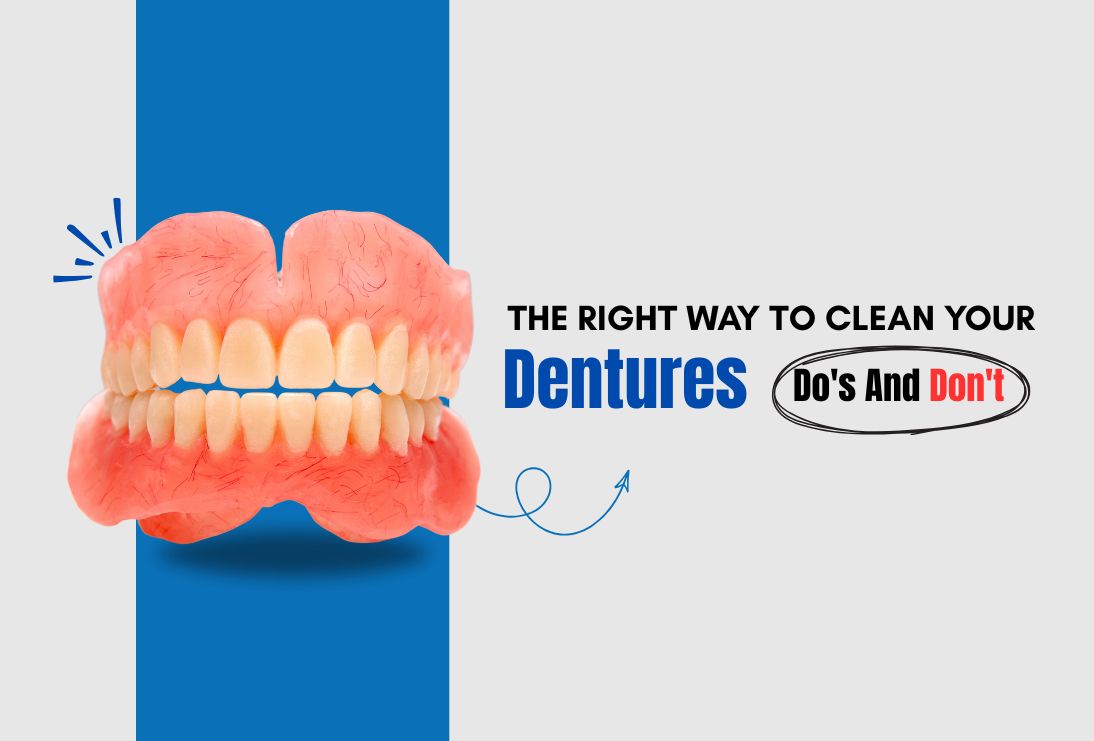
If you wear dentures, you already know how much they improve your quality of life from restoring your smile to helping you eat and speak more confidently. But just like natural teeth, dentures require daily care to keep them clean, functional, and comfortable.
At Teeth Care Multispeciality Dental Clinic, we believe that informed patients make the healthiest choices. That's why we've created this comprehensive guide on how to clean dentures properly, what products to use, and common mistakes to avoid.
Also read about: How to Keep Your Invisible Aligners Clean: 10 Expert Tips That Work
Wearing dentures doesn't mean you can skip your oral hygiene routine. In fact, cleaning dentures daily is essential for:
Let's start with the right practices to keep your dentures in great shape.
Use a soft-bristled toothbrush or a denture brush with non-abrasive denture cleanser. Brushing removes plaque, food particles, and stains.
Tip: Rinse dentures after every meal to reduce buildup.
Most dentures need to stay moist to maintain their shape. Soaking them in a dentist-recommended soaking solution or plain water overnight is the best practice.
Avoid soaking in hot water, which can warp the material.
Dentures can break if dropped. Always clean over a folded towel or sink filled with water to cushion any accidental drops.
Even if they've been soaking in solution overnight, rinsing them under running water before wearing helps avoid chemical residue ingestion.
Even if you wear full dentures, your gums, tongue, and palate still need cleaning to remove bacteria and improve blood circulation.
Use a soft toothbrush or gauze pad to gently clean oral tissues.
Routine check-ups ensure your dentures still fit properly and that your mouth remains healthy. At Teeth Care Multispeciality Dental Clinic, we recommend a check-up every 6-12 months for denture wearers.
Now, let's cover the mistakes you should avoid.
Most commercial toothpastes are too abrasive for dentures and can scratch the surface, making them more susceptible to plaque and stains.
Use only dentures-specific cleaners.
Bleach can whiten pink acrylic parts of your dentures and degrade metal clasps. It also weakens the material and can harm your oral tissues.
Avoid vinegar, household cleaners, or chlorine-based solutions.
Leaving dentures in open air will cause them to lose shape and become brittle. Always store them in a clean container with water or denture solution.
DIY denture repairs using glue or over-the-counter kits can lead to poor fit and further damage. Always see a professional for adjustments or fixes.
Our clinic offers same-day denture repair services for most cases.
Wearing dentures overnight can increase the risk of fungal infections and gum irritation. Unless your dentist instructs otherwise, always remove them before bedtime.
Even with perfect at-home care, dentures can still accumulate tartar and stains over time. A professional denture cleaning at your dental clinic helps maintain aesthetics and hygiene.
Here are some dentist-approved cleaning tools and products:
Always check with your dentist before using a new product.
Here are the different types of denture that can be cleaned using the techniques we described:
Watch for these signs:
If you notice any of these symptoms, book a consultation at Teeth Care Multispeciality Dental Clinic immediately.
Even with proper cleaning, dentures don't last forever. They usually need replacing every 5 to 7 years, depending on wear and changes in your jawbone or gum tissue.
Let us assess your fit and function during your next visit. We offer custom-fit dentures, repairs, and implant-supported alternatives for better comfort and stability.
At Teeth Care Multispeciality Dental Clinic, we take pride in offering personalized care for all your denture needs. Whether you're a first-time wearer or a long-time user, our expert team can help you maintain healthy dentures and a happier smile.
| Do's | Don'ts |
|---|---|
| Clean dentures daily | Don't use regular toothpaste |
| Soak them overnight | Don't let them dry out |
| Rinse before wearing | Don't bleach or scrub harshly |
| Clean your gums & mouth | Don't skip check-ups |
| Visit your dentist regularly | Don't DIY repair |
Maintaining clean dentures doesn't just improve your appearance - it's vital for your overall oral health. Follow these do's and don'ts, and you'll enjoy a longer-lasting, fresher-feeling smile.
Need help with denture care or adjustments?
Call us today to schedule your denture check-up at Teeth Care Multispeciality Dental Clinic.
Your comfort and confidence are just one visit away!
How often should I clean my dentures?
You should clean your dentures at least once a day using a soft-bristled brush and a non-abrasive denture cleaner. Additionally, rinse them after every meal to remove food particles and bacteria.
Can I use toothpaste to clean my dentures?
No. Regular toothpaste is too abrasive for dentures and can cause scratches. Use only denture-specific cleaners or mild hand soap as recommended by your dentist.
Is it safe to sleep with my dentures in?
It's generally not recommended to sleep with your dentures in. Removing them at night gives your gums a chance to rest and reduces the risk of infections or irritation. Only wear them overnight if instructed by your dentist.
What is the best solution for soaking dentures overnight?
Use a dentist-approved effervescent denture-cleaning tablet in warm water or plain lukewarm water. Avoid using hot water or household bleach, as they can damage the dentures.
How can I prevent bad odor in my dentures?
Clean your dentures thoroughly every day, soak them overnight, and brush your tongue and gums to reduce bacteria. If bad odor persists, visit your dentist as it could indicate an infection or poor fit.
How do I know when my dentures need to be replaced?
If your dentures feel loose, cause discomfort, have visible cracks, or don't fit properly, they may need to be adjusted or replaced. On average, dentures last 5-7 years with proper care.